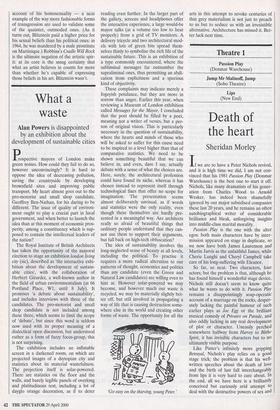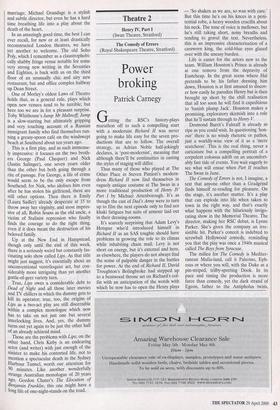Theatre 1
Passion Play (Donmar Warehouse) Jump Mr Malinoff, Jump (Soho Theatre) Lips (New End)
Death of the heart
Sheridan Morley
If we are to have a Peter Nichols revival, and it is high time we did, I am not con- vinced that his 1981 Passion Play (Donmar Warehouse) is the best one to start it off. Nichols, like many dramatists of his gener- ation from Charles Wood to Arnold Wesker, has indeed been shamefully ignored by our major subsidised companies these last 20 years, and he remains an often autobiographical writer of considerable brilliance and bleak, unforgiving insights into middle-class marital morality.
Passion Play is the one with the alter egos: both main characters have by inter- mission appeared on stage in duplicate, so we now have both James Laurenson and Martin Jarvis as the unfaithful James, while Cherie Lunghi and Cheryl Campbell take care of his long-suffering wife Eleanor.
So far, so neat. Two characters, four actors; but the problem is that, although he has found himself a wonderful stage device, Nichols still doesn't seem to know quite what he wants to do with it. Passion Play remains a disappointingly soap-operatic account of a marriage on the rocks, desper- ately lacking the painful humour of such earlier plays as Joe Egg or the brilliant musical comedy of Privates on Parade, and also oddly lacking in any real development of plot or character. Uneasily perched somewhere halfway from Harvey to Blithe Spirit, it has invisible characters but to no ultimately visible purpose.
Like Pinter's infinitely more gripping Betrayal, Nichols's play relies on a good stage trick; the problem is that his well- written speeches about the death of love and the birth of lust fall interchangeably from lips it is very hard to care about. In the end, all we have here is a brilliantly conceived but curiously arid attempt to deal with the destructive powers of sex and marriage; Michael Grandage is a stylish and subtle director, but even he has a hard time breathing life into a play about the death of the heart.
In an amazingly good time, the best I can ever recall, for new or at least drastically reconstructed London theatres, we have yet another to welcome. The old Soho Poly, which I remember as a claustrophobi- cally shabby fringe venue notable for some very strong new writing in the Seventies and Eighties, is back with us on the third floor of an unusually chic and airy new restaurant, bar and office complex halfway up Dean Street.
One of Morley's oldest Laws of Theatre holds that, as a general rule, plays which open new venues tend to be terrible; but here too we are in for a pleasant surprise. Toby Whithouse's Jump Mr Malinoff, Jump is a slow-starting but ultimately gripping and very touching account of a Russian immigrant family who find themselves run- ning a greasy-spoon café on the windswept beach at Southend about ten years ago.
This is a first play, and as such immense- ly impressive: it focuses on the two broth- ers George (Paul Chequer) and Nick (Justin Salinger), one seven years older than the other but both going through a rite of passage. For George, a life of crime would seem to be the only escape from Southend; for Nick, who idolises him even after he has stolen his girlfriend, there are still other options. Then there is Emily (Laura Sadler) already desperate at 15 to throw away her virginity, and most impres- sive of all, Robin Soans as the old uncle, a victim of Stalinist repression who finally finds the courage to do the right thing, even if it does mean the destruction of his beloved family.
Up at the New End in Hampstead, though only until the end of this week, there is a seriously weird but constantly fas- cinating solo show called Lips. As that title might just suggest, it's essentially about an unconventional ventriloquist act, but con- siderably more intriguing than yet another gottle-of-geer variety turn.
True, Lips owes a considerable debt to Dead of Night and all those later movies and TV chillers in which the dummy gets to kill its operator; true, too, the origins of Lips as a two-act play are still discernible Within a complex monologue which now has to take on not just one but several interlocking lives. And, yes, the dummy turns out yet again to be just the other half of an already schizoid mind. Those are the problems with Lips; on the other hand, Chris Kirby is an endearing actor (and writer) with just enough of the sinister to make his contorted life, not to mention a spectacular death in the Sydney Harbour Tunnel, worth our attention for 90 minutes. Like another wonderfully strange Australian monologue of 20 years ago, Gordon Chater's The Elocution of Benjamin Franklin, this one might have a long life of one-night-stands on the road.



























































 Previous page
Previous page